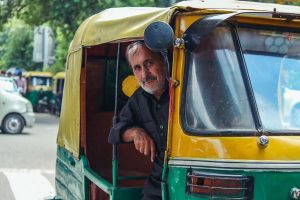People of Bharat: Salim Ashraf, Bengaluru

Salim Ashraf, who is now 49, was born and raised in Bengaluru. He lives in a small but comfortable two bed-room house in Bamboo Bazaar, Bengaluru. His house is surrounded with shops selling bamboo furniture and ladders. He lives here with his wife who is a home maker, and his two sons aged 14 and 12.
Just like his wife, Salim’s mother was a homemaker too; and his father supplied pulses and lentils to hotels around the city. Salim is the second among the eight children born to his parents and studied till sixth standard. He tells me that despite dropping out of school, he can speak four languages, including a little in English. Necessity and his father’s untimely death drove him to start working at the age of 15. He started working at a lathe machine workshop for Rs. 5 a day. In 2005, he and his brother started selling tea. The business did well and the brothers managed to make Rs. 500–1000 per day. When he and his brother got married, each started his own business. ‘Jab hamara maa tha sab milke tha, maa ke intekaal ke baad sab alag alag ho gaya’ (When our mother was alive she made sure we were together. After her death, we {brothers} separated).
In 2010, Salim bought an auto rickshaw and started driving it full time. Salim usually starts his day at 8:30 AM by dropping off his two children at school. Then he waits for passengers willing to go to Whitefield or Marathalli area and shuttles them there. He works till 2 PM and then heads home for lunch. After lunch and a little rest, he heads out again working till 8:30 PM before heading home for the day. Salim likes his work as an auto rickshaw driver. It gives him a lot of independence to travel anywhere he wants and attend social functions. ‘Humara guzara bhi hota hai aur public ki seva bhi’ (I make a living and also serve the public). He talks about the different kinds of customers — how some are very generous and some would squabble over a fair price for the ride.
Salim spends Rs. 300 on CNG (gas fuel) every day. He earns a maximum of Rs. 1000 on a good business day and his daily earnings range from Rs. 500–800. He spends about Rs. 6000 on rent and Rs. 5000 on groceries and school fees. His wife has recurring health problems (arthritis and thyroid) and he spends most of his income on her treatment. Last year he had admitted his wife twice in private hospitals — spending about Rs. 28,000 on treatment. Salim tells me he is unable to save anything. He has no insurance and is not aware of the medical insurance schemes.
When the 21 day lockdown was announced across the country, Salim grew anxious with only Rs.500 in his pocket. He approached a distant cousin and borrowed Rs. 10,000. He used this money to buy groceries during the lockdown; and the amount lasted him for 35 days. After that, he borrowed Rs. 5000 from his uncle. Salim has not been able to earn a living during the lockdown. Three days after the lockdown 4.0 was lifted in Bengaluru, Salim was able to earn only Rs. 100. ‘Hum do chaar din se gaadi lekar nikal pade hain par koi passenger nahi baithta’ (Since the past two-three days I leave home with my auto but no passenger is willing to take a ride). He is hoping people will start travelling soon but admits that regular traffic has been slow. ‘People are travelling in their own vehicles; malls, offices and schools are closed too’ he says. Salim has not paid his house rent for three months.
Few years ago, Salim had taken a loan of Rs. 1.5 lakhs from a private finance company and added Rs. 40,000 from his own savings to buy the auto. The lender kept his original license and registration certificate till he paid off the entire amount. Salim tells me he paid Rs. 50,000 as interest. He spends Rs. 1400 every year at the RTO for a Fitness Certificate for the auto. He also needs to spend for maintenance and repairs, if any. Salim had approached a gold finance company three years ago and had also taken a gold loan at a minimal interest. He has paid off all his formal loans and at present is not under any debt. He needs to repay back his relatives the money they lent him during the lockdown, but the rules of haath badli (informal money exchanges) are very different from those of a formal loan and involve a lot of relationship dynamics as well. Salim manages his money on his own — his wife is not interested in his earnings and expresses few needs. ‘She wants a new dress once a year on the festival of Id and she insists on making Biryani once a week,’ he explains.
Salim does not own a smartphone and is uncomfortable with the technology. He shares two such instances with me. He was once asked for his papers by a traffic inspector but he didn’t have them on him. He offered mailing the pictures of the documents to the police officer’s phone since he didn’t own a smartphone. This led to an altercation and a fine. Another time, Salim tried enlisting with a transportation services company but could not figure out customer location on the technology’s app. This led to lot of problems in picking up clients. After pay cuts for not picking up clients, he decided to delist himself from the company.
Salim’s older son owns a smartphone and uses it for his studies and entertainment. Salim does not know how to operate a smartphone and desists financial transactions done online. He nurtures two dreams. Firstly, he wishes for his children to study well and get good jobs in air-conditioned offices; so that they do not have to work hard like him. ‘I tell my sons that there is respect in getting an education. Even a taxi driver’s job is respectable if he is educated,’ adds Salim. Secondly, he wants to go on a pilgrimage to Haj. I ask him how he expects to manage the trip without savings. He tells me he has an entitled share in the ancestral property. He is expecting a good price for it and hopes his share of the money from the sale will help him fund his dream of going to Haj.
Salim has no aspirations to earn more; he is happy with his current means of livelihood. He believes he cannot earn anymore than what Providence has in store for him. This keeps him from ruminating about his financial future. Death of his mother was followed in quick succession by the passing away of his younger sister leaving him severely depressed for a long time. He admits that he still feels emotionally low at times. The recent health concerns of his wife have exacerbated his depression. However, he tells me with conviction that he is not the one to entertain suicidal thoughts. Salim believes life to be a primal gift from God and only he can take it away.
As I wind up the interview I can’t help but think of how the lockdown has affected people’s economic, physical and mental health. Many like Salim, are pushing through in hope for better times ahead.
This story has been developed in partnership with Lakshya. A Financial Inclusion Lab startup, Lakshya is working towards developing innovative financial solutions for the urban underserved to reduce their financial stress. At present they are closely working with autorickshaw drivers. Lakshya is based out of Bangalore, India.
This research was developed as part of the Bharat Inclusion Initiative.
